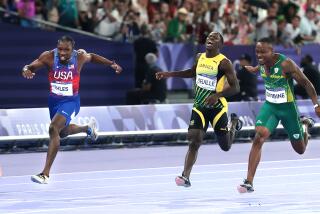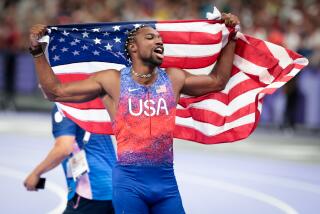Krulee Still Is Running in the Shadows : His Best Often Wasn’t Enough to Beat the Best
- Share via
About the best summation of Marty Krulee’s career as a sprinter can be found in the 100-meter race in which he recorded his personal best.
He didn’t win. He didn’t even place among the top three.
In 1983, in Zurich, he ran a 10.19 and finished sixth. Five of the eight runners posted their best times in the race but didn’t win. Calvin Smith won with a time of 9:97 (he set a world record earlier in the summer at 9:93).
That was not the first nor the last time Krulee, who trains on the UC Irvine track and lives in Capistrano Beach, was overshadowed. It’s something he has had to live with as long as he has been running.
When Krulee went out for track as a freshman at Branham High School in San Jose, he was too slow for the sprints so the coach made him a hurdler. He didn’t make the varsity until he was a senior, but finally began to blossom into an outstanding runner.
He attended West Valley Community College, and continued to run well. Still, Krulee wasn’t the area’s top runner.
He was constantly beaten by Millard Hampton, who won a gold medal as a member of the U.S.’s 400-meter relay team in the Montreal Games. Hampton also won the silver medal in the 200 meters behind gold medalist Donald Quarie of Jamaica.
Krulee didn’t get a scholarship offer coming out of high school or junior college. He paid his way to run at San Diego State.
At San Diego State in 1978, Krulee was a fine sprinter, but with Clancy Edwards competing at USC, he didn’t get much attention--again. Edwards was one of the world’s best sprinters, and the focus of much adulation.
“I’ve always been a shadow,” Krulee said. “But it gives you the motivation to keep on running.”
Krulee always has been on the fringe of the track elite. His times are world class but just not world class enough to win.
“If I were to retire today not too many people would care,” he said. “My friends would care and few people I met in Europe would care, but not many others. There are just so many good sprinters in the United States.”
At 29, retiring should be on most sprinters’ minds, but not Krulee’s. He keeps trotting through his mind the cliche how on any given day any given runner . . .
“Look at guys like Allan Wells (the 1984 gold medalist in the 100 in Moscow) and Quarrie (the silver medalist in the 100 in Montreal in 1976) who both ran competitively into their 30s. I think I can keep running for a few more years as long as I stay healthy.
“You’re not dead till you say you are.”
Krulee works part of the year as an electrical contractor in San Jose with his brother, and also sells track equipment. Krulee worked in health club in England where he trained for half of last year before injuring his hamstring.
“It was not until I went to Europe that I noticed I could be world class,” he said. “Running in college I went up against guys like Edwards and thought, ‘If this guy is this good, and he’s only local, imagine how good they are around the rest of the world.’
“When I went there (in 1981), I realized there are maybe 20 really good sprinters in the United States maybe 20 in all of Europe. There, I wasn’t a big fish in a little pound but I was a bigger fish in a little smaller pond.”
Memories of 1983--when he was at the top of his running--keep him training daily.
That summer, Krule ran his best times in the 100 and 200 meters. He also had a double win in the 100 and 200 at Gothenberg, Sweden that summer.
At the start of the 1984 season, Krulee was ranked seventh in the United States in the 200. Any hopes of participating in the 1984 Summer Olympics were lost, however, when he suffered a stress fracture in his right foot.
That was his second disappointment in an Olympic year. In 1980, when President Jimmy Carter imposed the U.S. team boycott, Krulee finished ninth in the national championships in the 200 meters.
“I was on a good roll and running well,” Krulee said. “But, once the boycott was announced, I don’t know, it just took something, a little edge out of my training. I had just quit a good job to train but there wasn’t much else I could do.”
Krulee doesn’t run with the motivation of competing in Seoul in 1988. Instead, he is focusing on the prestigious Mt. San Antonio Relays, April 25-27.
Krulee said he trains at UC Irvine because of the mild Southern California winters, and the seclusion offered by the campus. Although Krulee does not have a coach, he trains with Daley Thompson, a two-time decathlon Olympic gold medalist from England. They met at San Diego State. Krulee, Thompson, Kimmo Saaristo of Finland and decathlete Greg Richards live in a house in Capistrano Beach.
“Daley has really helped me,” Krulee said. “I use a lot of his workouts and it helps to have the support of him and my other friends when I’m working out. Some days when I work out, it helps to have them there to make fun of me if I’m tired or need to be motivated.”
More to Read
Get our high school sports newsletter
Prep Rally is devoted to the SoCal high school sports experience, bringing you scores, stories and a behind-the-scenes look at what makes prep sports so popular.
You may occasionally receive promotional content from the Los Angeles Times.






